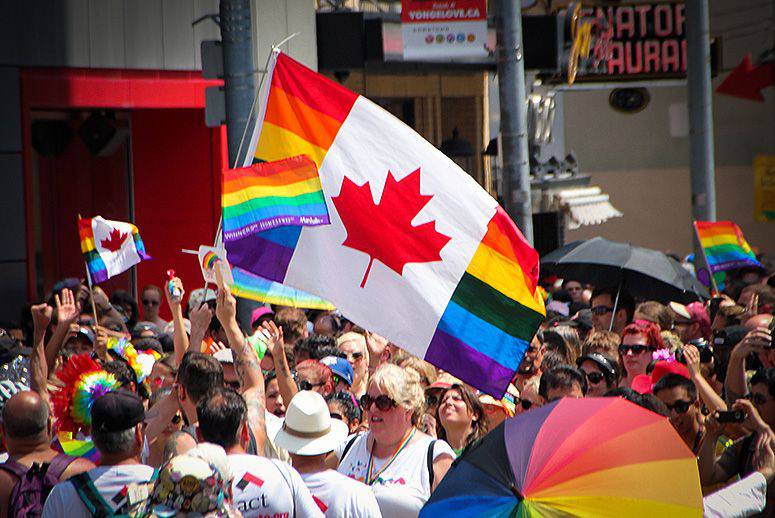- Joined
- Jan 25, 2014
- Messages
- 11,991
- Reaction score
- 1,411
- Points
- 159
Canada to LGBT Refugees: You’re Welcome Here, but First Prove You’re LGBT
TakePart | By Nicole Mormann | October 1 2015
A report released Tuesday suggests that Canada’s policy for those fleeing persecution for their sexual and gender identity needs immediate reform.

Even so, I think Canada is more welcoming and accepting than the U.S. towards LGBT asylum seekers.
TakePart | By Nicole Mormann | October 1 2015
A report released Tuesday suggests that Canada’s policy for those fleeing persecution for their sexual and gender identity needs immediate reform.

With one-third of countries around the world continuing to criminalize those who identify as LGBT, many refugees turn to nations such as Canada, where asylum is granted to those facing persecution for their sexuality and gender identity in their home countries.
Though the law makes Canada seem like an LGBT-friendly nation, a recent report released by Envisioning Global LGBT Human Rights, a grassroots-sponsored research and doentary project, suggests the immigration process for LGBT asylum seekers there is anything but welcoming.
In the 59-page report, Is Canada a Safe Haven for Refugees?, a team of researchers identified the numerous challenges that the claims process presents for LGBT people attempting to enter the country, including proving their sexual and gender identity.
“In Canada, there are hoops and hurdles that only LGBT refugees, and not other refugees, have to jump through in order to get in and stay there,” Nick Mule, one of the report’s authors, told Vice News. “Some of these people are coming from countries where they cannot be open and free about being gay or lesbian. And suddenly you have an immigration official asking them to reveal personal information that they might never have shared in public before.”
Under Canadian law, refugees must provide evidence of their sexual orientation and gender identity when making a claim for protection. This can take the form of police reports, medical files, or other testimonials, such as personal letters written by family and friends verifying the person’s sexuality, which can all be difficult to obtain. Considering that those seeking asylum have only 15 days to submit their Basis of Claim statement, this can make the process even more taxing. Prior to the passage of the Protecting Canada’s Immigration System Act in December 2012, they had 28 days to submit the claim.
Researchers chronicled the experiences of 92 refugees seeking asylum in Toronto from 2012 to 2014. The report shared many of the participants’ narratives of the fear, anxiety, and harrowing threat of deportation they faced going through the claims process.
“You feel like you are being persecuted, proving yourself,” said one participant. “But there’s a constant fear that once it gets rejected, you have openly declared as LGBT and you will be deported back to your country…once you’ve declared yourself and you go back, you know you are going to face persecution.”
Another participant told researchers the story of facing possible deportation after being confronted by a female official on arrival at a Toronto airport. At first, the woman said the participant would be sent back home, but then she probed for more information.
“She said, ‘Please tell me. Feel free. Otherwise you are boarding the next plane.’ It took me time to tell her the truth. I told her, ‘I am seeking for asylum. I fled my country. I’m a gay activist and a bisexual.’ ” The participant was not deported.
Most LGBT people seeking refuge in one of the 42 nations that grant asylum to persecuted individuals are traumatized from the discrimination they faced in their home countries, let alone the anxiety they experience entering a new one, according to the report.
In addition to being given limited time to make a claim, refugees also lack access to housing, health care, and other basic services.
“Though Canada can be commended for recognizing sexual orientation and gender identity as grounds to make refugee and asylum claims, it’s evident that current policies are detrimental to those entering the country who identify as LGBT,” Mule told TakePart. “Our fear is that legitimate claims will be deemed unsuccessful by the Immigration Review Board due to their lack of knowledge or insensitivity to the realities that these asylum seekers and refugees face.”
With these issues in mind, the report gives 37 recommendations for how the current system could be improved, including the implementation of anti-discrimination training at refugee camps, providing evidence of persecution and not identity, and safe housing arrangements with gender-neutral washrooms.
SOURCE
Even so, I think Canada is more welcoming and accepting than the U.S. towards LGBT asylum seekers.
